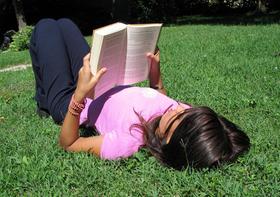If you have children in private school, then you are most likely looking at three months, perhaps even longer, which you must fill with activities of one kind or another during the long summer break. Your children are accustomed to structure during the other nine months of the year. It is a good idea to plan their vacation months. The structure will be there, just much more flexible and adaptable to the needs of the day. Let's look at some of your options for making summer a special time for both you and your children.
Young Children (ages 4-10)
Most schools offer summer sessions. Depending on its resources a school may offer all-day sessions or just a long morning session running from approximately 9 until 1. If the school has had a summer session for several years, it probably has worked out most of the kinks. But keep an eye out for the quality of each activity. Is the school merely providing glorified babysitting or are the activities well-planned, well-organized, and well-supervised by qualified personnel?
This video offers a glimpse at a summer camp and its programs.
The advantage of sending a young child to a summer session at her school is that she knows just about everybody anyway. Even more important for your wee one is that the daily routine is similar to what she is already comfortable with. My biggest concern with summer sessions is planning. Weather doesn't cooperate every day, so that refreshing time in the pool can't always be counted on. What's planned for those rainy days? Rainy days need not be days filled with boredom.
The safety of your youngster is paramount every day. But in the summer there tend to be more outdoor activities on the schedule. Are situations like bee stings and sunburns something the school is equipped to deal with? Is there a nurse on staff? Is the swimming properly supervised by qualified lifeguards? Ask questions about those and other safety concerns BEFORE you commit to sending your child to a summer session. Your child's safety and your peace of mind are major considerations when choosing a summer program.
PreTeens and Early Teens
The supervision considerations and list of activities ratchet up several notches with preteens and young teenagers - the 11-14-year-old set. This crowd gets bored easily. So the questions you need to ask concern the activities which are scheduled. Hopefully, the school has an assortment of options - every teenager likes choices, lots of them - and enough variety to keep the choruses of "This is boring" to a minimum. Fun, challenging activities would be on my 'must-have' list. Things like bread making and cake decorating, for example, take lots of time, energy, and concentration. Their Facebook pages will be full of pictures of their creations.
As long as the school provides a well-structured 'learning' program for your young teens, the only thing left is physical activity. Swimming, baseball, soccer, and so on will round out a full day's activities. The thing to watch for with this age group is that the school provides proper supervision. Feelings and egos are easily bruised. Skilled, empathetic adults need to be the anchor with this age group. Once again make sure that experienced, qualified paraprofessionals are on hand and on-call for the inevitable injuries.
Older Teens
Children in the 15-18 age group have developed interests, hopefully. Play to those. If he would be happiest going off to a riding school program for 4 weeks, do it. If she would thrive studying political science at a university summer session for high school students, find one of those programs and sign her up.
This video offers a look at a university summer enrichment session.
It is a little scarier for us parents to have our children go off someplace in another state or city where we can't get our hands on them easily. But if you have done your job well and raised a young person who is about to leave the nest and go off to college in a year or two, then this is a kinder, gentler way for us parents to get used to that idea. Your child will be fine. But it will be tough for you without him underfoot. Helicopter parents will find it difficult not to hover. Relax. Land the 'copter. Chill.
The same guidelines as we covered above still apply. Ask about the program in detail. Know what is covered. Determine if it meets your requirements. If it doesn't, look elsewhere. You will have plenty of options available. Ask about the downtime. How is it supervised? 24/7 supervision? You are planning to entrust your child to a group of adults you probably do not know personally. Check their references carefully. Ask parents who have sent their children in previous years about their experiences.
It is extremely important to do your due diligence thoroughly when sending your older teen away from home. Establish protocols for communicating. Regular times for phone calls are a must. You need to hear how your child sounds. Texting won't reveal much about her moods. You see, the bubble wrap has come off. But the parenting never ends.
Your Own Family Activities
Summer is a wonderful opportunity for enrichment. The above activities will work just fine for most of us who are working full-time jobs and cannot take more than a week or two for time off. But if you happen to be fortunate enough not to have to worry about vacation schedules and have the means to do so, then taking your family off for a month or two to a cottage at the lake or seaside might be worth exploring.
My summers as a young child were spent in Chateauguay on the south shore of Lake Saint Louis, Quebec. We belonged to a modest, ramshackle swim club where my brothers, sister, and I all took swimming lessons and Red Cross swimming exams. As a teenager, I remember spending most of the summer on Grand Manan Island in the Bay of Fundy. Daily hikes, trips out on a lobster boat, and seining the weirs were activities that left a deep impression on me. In those days before computers, cell phones, and Facebook, preparing and enjoying meals were always family activities. We each had a role to play and tasks assigned. Oh, and we read a lot. Mother was a voracious reader and she made sure we brought along enough reading material for our time away.
Some families opt to send their children off to spend a few weeks with aunts and uncles and grandparents. In many cases that works extremely well. Just make sure that the same rules of the road apply while your child is away. Curfews, who she is allowed to drive with, what she is allowed to spend, and so on need to be discussed and clearly understood both by her and your relatives.
Make summer a special time for you and your children. And, please, share your summer exploits on Private School Review's Facebook page. We'd all love to hear about what you did.
Questions? Contact us on Facebook. @privateschoolreview





















